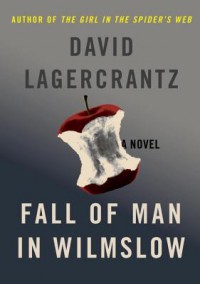"Fall of Man in Wilmslow", by David Lagercrantz

This story, a melding of two narratives, is an attempt to capture a sympathetic biography of Alan Turing who was badly treated by the establishment and a police procedural in which a detective tries to get to the bottom of a mystery.
This disturbing tale of Turing’s suicide and the circumstance that let to it is told through the eyes of Detective Leonard Corell who was in charge of the investigation. The book reveals Turing’s life and his obsession with mathematics but above all we are shown the anti-gay attitudes at the time and openly admitting to homosexuality was treated as a crime. The novel is set in 1954. More than half the story is devoted to follow Corell.
The book contains a wealth of details about life and theories although it came out somewhat between a dramatized version of a biography and a kind of a lousy detective drama. I really couldn’t tell where the fine line stood between the historical part and where we stepped into the author’s vivid imagination. I also found the characterization to be not only dull but also very thin. I will not expand any further and leave to the readers whether to like or dislike the way this story develops.
What a pity, I would have loved to know more of this exceptional man and have more confidence in what was written. This is not the case here. I also had a hard time keeping my attention at bay, too much intellectual stimulation needed to keep up with the mathematical concepts and philosophical conversations making a painfully slow moving plot one that couldn’t held my attention till the end. Too many dull moments and I agree with those saying this is one of those books that work better as a cure for insomnia.
This novel is not for everyone, it was definitely not mine not to say it wasn’t good book it was simply not my cup of tea.
I received this book from the publisher in exchange for an honest review. This does not affect my opinion of the book or the content of my review. “This is the way I see it”.
This disturbing tale of Turing’s suicide and the circumstance that let to it is told through the eyes of Detective Leonard Corell who was in charge of the investigation. The book reveals Turing’s life and his obsession with mathematics but above all we are shown the anti-gay attitudes at the time and openly admitting to homosexuality was treated as a crime. The novel is set in 1954. More than half the story is devoted to follow Corell.
The book contains a wealth of details about life and theories although it came out somewhat between a dramatized version of a biography and a kind of a lousy detective drama. I really couldn’t tell where the fine line stood between the historical part and where we stepped into the author’s vivid imagination. I also found the characterization to be not only dull but also very thin. I will not expand any further and leave to the readers whether to like or dislike the way this story develops.
What a pity, I would have loved to know more of this exceptional man and have more confidence in what was written. This is not the case here. I also had a hard time keeping my attention at bay, too much intellectual stimulation needed to keep up with the mathematical concepts and philosophical conversations making a painfully slow moving plot one that couldn’t held my attention till the end. Too many dull moments and I agree with those saying this is one of those books that work better as a cure for insomnia.
This novel is not for everyone, it was definitely not mine not to say it wasn’t good book it was simply not my cup of tea.
I received this book from the publisher in exchange for an honest review. This does not affect my opinion of the book or the content of my review. “This is the way I see it”.







